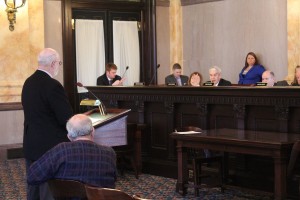COLUMBUS — The Senate Ag Committee is on track to approve a bill related to certain restrictions of when manure and fertilizer can be applied to farmers’ fields.
The committee held a public hearing for S.B. 1, known as the Clean Lake Erie Act of 2015, Feb. 4 at the Statehouse. The goal is to have amendments submitted by the end of the day Feb. 12, setting up a possible floor vote Feb. 18.
While the bill is moving fast, most of the provisions are based on H.B. 490, which was approved by the House last session, with broad support from farmers and farm organizations.
There are some new provisions, however, one which would create the “Office of Harmful Algae Management and Response” within the Ohio EPA.
Background
Senate Bill 1 is sponsored by senators Randy Gardner, R-Bowling Green, and Bob Peterson, R-Sabina.
In his sponsor testimony, Feb. 3, Gardner said “saving Lake Erie requires a new sense of urgency equal to the value Lake Erie provides for Ohio and our nation.”
Peterson, who himself is a farmer, offered similar testimony, noting it made sense to begin with the same basic bill House members had already approved. He was unable to attend the hearing Feb. 4, due to recovery from a car accident.
Testifying first was Adam Sharp, vice president of public policy with Ohio Farm Bureau Federation. He reminded senators of the importance of “simultaneously” considering water quality and food production, and that neither thing is “exclusive of the other.”
Sharp also updated the Senate on the various conservation and nutrient stewardship projects Farm Bureau is supporting, including the organization’s $1 million commitment, and recent work with neighboring state Farm Bureaus, to secure $17.5 million in farm bill conservation funds related to the water quality issue.
Sharp shared similar testimony with the House Ag and Rural Development Committee Jan. 29, which is holding its own public hearings and working to write a new, but related bill.
Sharp said Ohio Farm Bureau supports the state’s new fertilizer certification requirement, approved in 2014, and that the organization is working to get farmers in the Western Lake Erie Basin state-certified by April 22 — which is more than two years ahead of the deadline.
Want action
End users of the lake, including the 11 million who rely on it for drinking water, and for employment and recreation — hope the new regulations bring relief.

David Spangler, vice president of Lake Erie Charter Boat Association, told the Senate committee that algae blooms and “do not drink” orders have “reached a critical stage” that is “simply unacceptable.”
Spangler, who also is president of Lake Erie Waterkeeper — an advocacy and education organization — said both organizations support the kind of fertilizer and manure restrictions the Senate is considering.
He said excessive phosphorus, which feeds the toxic algae, is also causing a shift in the kinds of aquatic life in the lake. According to Spangler, fishermen are seeing a shift from desirable species like walleye and perch, to an increase in less desirable species, like white perch, catfish and fresh water drum.
Spangler also called for removal of the bill’s “sunset clause,” which provides for a five-year review to determine if the rules in the legislation are still appropriate.
“A practice that is wrong today will not magically be acceptable five years from now,” he said.
The sunset clause is also a point of contention for the Ohio Environmental Council.
“If spreading manure and fertilizer under the specified circumstances is a bad practice now, then it will still be a bad practice in five years,” said Adam Rissien, ag and water policy director for OEC.
But the sunset clause is also a way of keeping the law pertinent to the era that it applies. Farmers who testified at the House ag committee hearing said a five-year review would help reflect changes in future technology, and other circumstances that may change over the next five years.
More restrictions
Rissien said OEC supports farmers’ voluntary actions, as well as the restrictions on manure and fertilizer application, but OEC would like to see additional regulations and elimination of certain exemptions.
The OEC is also calling for statewide restrictions on applying manure and fertilizer, broadening the ones that are currently limited to the Western Lake Erie Basin.
Moving ahead
Senate Ag Committee Chairman Cliff Hite, R-Findlay, said the committee hopes to receive all amendments to the bill Feb. 12, by 5 p..m, setting up another hearing for Feb. 17, and a possible Senate floor vote by Feb. 18.
If so, that would most likely put the Senate bill ahead of the House’s bill, which has yet to be released. But Hite said the House ag Committee would have a chance to accept the Senate bill, or propose amendments.
Hite said S.B. 1 also includes an emergency clause, so lawmakers can make the law effective by the start of the 2015 growing season, or about the same time it would have become effective under H.B. 490.
Hite said the reason H.B. 490 did not move in the Senate last year was because of the many unrelated, non-ag policies that were added.
“Those things can come and go whenever, but the ag-related stuff is extremely important and it needs to be done as quickly as possible,” he said.
Similarities and differences:
The Clean Lake Erie Act (S.B. 1) contains these same provisions as H.B. 490:
1. The transfer of the Agriculture Pollution Abatement Program from the Ohio Department of Natural Resources to the Department of Agriculture.
2. A prohibition on the spreading of manure and fertilizer on frozen and saturated ground.
3. Phosphorus monitoring at water treatment plants.
4. The goal of ending open-lake disposal of dredged material in Lake Erie.
5. Sewer rules, point and nonpoint source study by Ohio EPA, and lead plumbing provisions.
New provisions included in S.B. 1:
Emergency clause. This gives lawmakers the opportunity to make the law effective by the start of growing season this spring. This schedule would allow the bill to become law at almost exactly the same time as H.B. 490 would have taken effect if it had been enacted in December.
Healthy Lake Erie Fund. The Senate Ag Committee has updated language first enacted in 2012 that established this fund to help with agricultural best practices and the monitoring of tributaries feeding Lake Erie.
The Office of Harmful Algae Management and Response. This office is proposed for the Ohio EPA and it would strive to support agriculture, local government and water treatment plant personnel.
Dredging and Open-Lake Disposal. S.B. 1 retains H.B. 490’s goal to end open-lake disposal of dredged material, but adds language that provides some flexibility with the acknowledgement that we must achieve changes in federal policies with the Army Corps of Engineers to reach this goal.
(Related coverage:)











